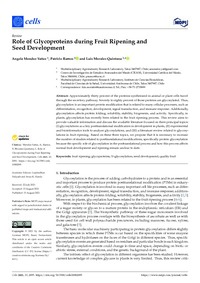Role of glycoproteins during fruit ripening and seed development
Autor
Mendez-Yañez, Angela
Ramos, Patricio
Morales-Quintana, Luis
Fecha
2021Resumen
Approximately thirty percent of the proteins synthesized in animal or plant cells travel through the secretory pathway. Seventy to eighty percent of those proteins are glycosylated. Thus, glycosylation is an important protein modification that is related to many cellular processes, such as differentiation, recognition, development, signal transduction, and immune response. Additionally, glycosylation affects protein folding, solubility, stability, biogenesis, and activity. Specifically, in plants, glycosylation has recently been related to the fruit ripening process. This review aims to provide valuable information and discuss the available literature focused on three principal topics: (I) glycosylations as a key posttranslational modification in development in plants, (II) experimental and bioinformatics tools to analyze glycosylations, and (III) a literature review related to glycosylations in fruit ripening. Based on these three topics, we propose that it is necessary to increase the number of studies related to posttranslational modifications, specifically protein glycosylation because the specific role of glycosylation in the posttranslational process and how this process affects normal fruit development and ripening remain unclear to date.
Fuente
Cells, 10(8), 2095Link de Acceso
Click aquí para ver el documentoIdentificador DOI
doi.org/10.3390/cells10082095Colecciones
La publicación tiene asociados los siguientes ficheros de licencia:


